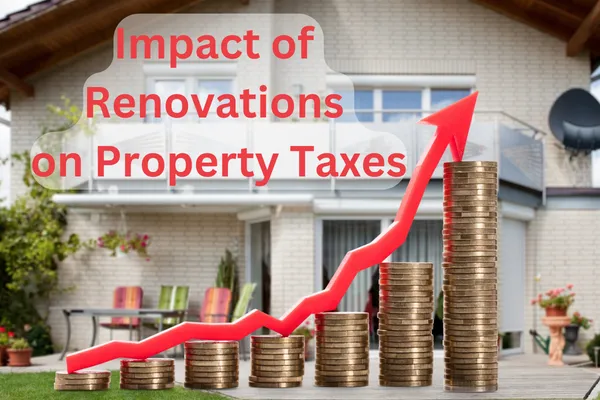Recent Posts

The impact of home renovations on property taxes
“I'm proud to be paying taxes in the United States. The only thing is - I could be just as proud for half the money .” - Arthur Godfrey
Introduction:
Home renovations are a common method for updating, enhancing, or expanding your living area. Whether it involves upgrading the kitchen, remodeling a bathroom, or adding a room, these projects can enhance your quality of life. However it's important for homeowners to be aware that renovations can also result in an increase in property taxes.

Not all renovations will increase property taxes. It depends on the type and extent of the renovation.
Understanding Property Taxes
Before we delve into the effects of renovations, lets first gain an understanding of property taxes. Property taxes are imposed by governments to finance services like schools, roads, and public safety initiatives. They are typically calculated based on the assessed value of your property.
Property tax rates differ from one location to another and are generally expressed as a percentage of your property's assessed value. Local governments utilize revenue from property taxes to provide essential services and maintain community infrastructure.
Home Renovations and Property Value
One of the main factors that impact property taxes is the assessed value of your house. Local assessors determine this value based on various factors, including the size, location, and condition of your property.
When you undertake significant renovations in your home, like expanding its square footage, upgrading the kitchen, or remodeling the master suite, these enhancements can increase the overall value of your property. A higher assessed value may result in higher property taxes.
Renovation Types that Influence Taxes
Not all renovations have an impact on your property's assessed value. Certain upgrades are more likely to raise your homes worth and consequently affect property taxes. Lets explore which types of renovations tend to have this effect.
Structural Additions: Expanding your house by adding rooms, a new floor, or a larger garage can significantly elevate its assessed value.
Kitchen and Bathroom Remodels: These popular renovations often boost property value. Upgrading to modern appliances, countertops, and fixtures can lead to a higher assessed value.
Outdoor Improvements: Enhancing landscaping features such as decks, patios, and swimming pools can enhance both the appeal and value of your property.
Energy-Efficient Upgrades: By installing features like solar panels, glazed windows, or improving insulation, you not only contribute to energy efficiency but also enhance your property's overall worth. It may also qualify you for certain tax incentives.
The Assessment Process
It's important to understand the assessment process, as assessors use different methods to determine your home's value. Factors such as size, age, condition, location, and recent sale prices of similar properties in your area are considered. Property assessments are typically conducted periodically, usually annually or every few years. When you complete a renovation assessors may adjust the value of your property to reflect the changes made.
How Renovations Affect Property Tax
Now let's dive into how renovations can impact property taxes. We'll explore how they can increase your property's value and consequently lead to higher tax obligations when your home gets reassessed based on its current market worth.
Tips for Managing Property Taxes
While completely avoiding property taxes is not possible there are strategies to manage and mitigate the impact of increased property taxes resulting from renovations. Lets explore these tactics together.
Utilize Homestead Exemptions: Certain areas provide homestead exemptions that can lower your property's value thereby reducing your tax burden. There are criteria that must be met to qualify for Homestead Exemptions.
Consider Appealing Your Assessment: If you believe that your property has been overvalued following a renovation it might be worth exploring the possibility of appealing the assessment to ensure an accurate valuation.
Thoughtful Renovation Planning: Before embarking on renovations it is wise to consider the tax implications. You may choose to undertake renovations in phases or prioritize energy-efficient upgrades that could qualify for tax incentives.
Understanding Local Regulations: The role of regulations and tax laws cannot be underestimated when it comes to how renovations impact your property taxes. It is crucial to have an understanding of these regulations and their implications.
Explore Tax Incentives; In some jurisdictions, specific types of renovations aimed at improving energy efficiency may be eligible for tax incentives. These incentives can help offset any increases in property taxes resulting from your renovation project.
Conclusion
In conclusion, undertaking home renovations can undoubtedly enhance both your living space and property value. By employing these strategies and staying informed about current regulations you'll be able to manage and minimize any adverse impacts on your property taxes.
FAQs
1. Do all renovations increase property taxes?
No, not all renovations will increase property taxes. It depends on the type and extent of the renovation.
2. Can I appeal my property tax assessment after a renovation?
Yes, in many areas, you can appeal your property tax assessment if you believe it's inaccurate.
3. How can I estimate the potential tax increase before renovating?
You can consult with your local assessor's office or a real estate professional to get an estimate of how renovations might affect your property taxes.
4. Are there tax incentives for energy-efficient renovations?
Some areas offer tax incentives or credits for energy-efficient renovations. Check with your local government for details.
5. Should I consider property taxes when planning a renovation?
Yes, it's advisable to consider potential property tax increases when planning a renovation to ensure it aligns with your budget and financial goals.
Recent Posts

The impact of home renovations on property taxes
“I'm proud to be paying taxes in the United States. The only thing is - I could be just as proud for half the money .” - Arthur Godfrey
Introduction:
Home renovations are a common method for updating, enhancing, or expanding your living area. Whether it involves upgrading the kitchen, remodeling a bathroom, or adding a room, these projects can enhance your quality of life. However it's important for homeowners to be aware that renovations can also result in an increase in property taxes.

Not all renovations will increase property taxes. It depends on the type and extent of the renovation.
Understanding Property Taxes
Before we delve into the effects of renovations, lets first gain an understanding of property taxes. Property taxes are imposed by governments to finance services like schools, roads, and public safety initiatives. They are typically calculated based on the assessed value of your property.
Property tax rates differ from one location to another and are generally expressed as a percentage of your property's assessed value. Local governments utilize revenue from property taxes to provide essential services and maintain community infrastructure.
Home Renovations and Property Value
One of the main factors that impact property taxes is the assessed value of your house. Local assessors determine this value based on various factors, including the size, location, and condition of your property.
When you undertake significant renovations in your home, like expanding its square footage, upgrading the kitchen, or remodeling the master suite, these enhancements can increase the overall value of your property. A higher assessed value may result in higher property taxes.
Renovation Types that Influence Taxes
Not all renovations have an impact on your property's assessed value. Certain upgrades are more likely to raise your homes worth and consequently affect property taxes. Lets explore which types of renovations tend to have this effect.
Structural Additions: Expanding your house by adding rooms, a new floor, or a larger garage can significantly elevate its assessed value.
Kitchen and Bathroom Remodels: These popular renovations often boost property value. Upgrading to modern appliances, countertops, and fixtures can lead to a higher assessed value.
Outdoor Improvements: Enhancing landscaping features such as decks, patios, and swimming pools can enhance both the appeal and value of your property.
Energy-Efficient Upgrades: By installing features like solar panels, glazed windows, or improving insulation, you not only contribute to energy efficiency but also enhance your property's overall worth. It may also qualify you for certain tax incentives.
The Assessment Process
It's important to understand the assessment process, as assessors use different methods to determine your home's value. Factors such as size, age, condition, location, and recent sale prices of similar properties in your area are considered. Property assessments are typically conducted periodically, usually annually or every few years. When you complete a renovation assessors may adjust the value of your property to reflect the changes made.
How Renovations Affect Property Tax
Now let's dive into how renovations can impact property taxes. We'll explore how they can increase your property's value and consequently lead to higher tax obligations when your home gets reassessed based on its current market worth.
Tips for Managing Property Taxes
While completely avoiding property taxes is not possible there are strategies to manage and mitigate the impact of increased property taxes resulting from renovations. Lets explore these tactics together.
Utilize Homestead Exemptions: Certain areas provide homestead exemptions that can lower your property's value thereby reducing your tax burden. There are criteria that must be met to qualify for Homestead Exemptions.
Consider Appealing Your Assessment: If you believe that your property has been overvalued following a renovation it might be worth exploring the possibility of appealing the assessment to ensure an accurate valuation.
Thoughtful Renovation Planning: Before embarking on renovations it is wise to consider the tax implications. You may choose to undertake renovations in phases or prioritize energy-efficient upgrades that could qualify for tax incentives.
Understanding Local Regulations: The role of regulations and tax laws cannot be underestimated when it comes to how renovations impact your property taxes. It is crucial to have an understanding of these regulations and their implications.
Explore Tax Incentives; In some jurisdictions, specific types of renovations aimed at improving energy efficiency may be eligible for tax incentives. These incentives can help offset any increases in property taxes resulting from your renovation project.
Conclusion
In conclusion, undertaking home renovations can undoubtedly enhance both your living space and property value. By employing these strategies and staying informed about current regulations you'll be able to manage and minimize any adverse impacts on your property taxes.
FAQs
1. Do all renovations increase property taxes?
No, not all renovations will increase property taxes. It depends on the type and extent of the renovation.
2. Can I appeal my property tax assessment after a renovation?
Yes, in many areas, you can appeal your property tax assessment if you believe it's inaccurate.
3. How can I estimate the potential tax increase before renovating?
You can consult with your local assessor's office or a real estate professional to get an estimate of how renovations might affect your property taxes.
4. Are there tax incentives for energy-efficient renovations?
Some areas offer tax incentives or credits for energy-efficient renovations. Check with your local government for details.
5. Should I consider property taxes when planning a renovation?
Yes, it's advisable to consider potential property tax increases when planning a renovation to ensure it aligns with your budget and financial goals.

1349 W. Lane Ave, Suite 1125, Columbus, OH, 43221
(614) 769-7766
(614) 768-6531
www.livingincolumbus.com





